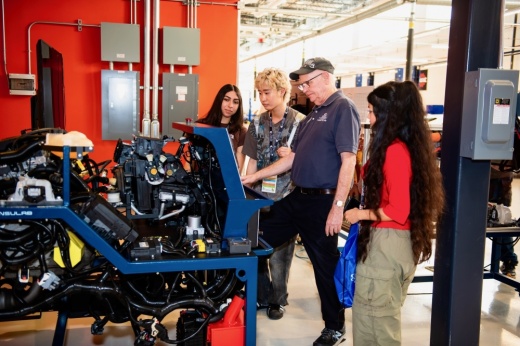The big picture
Through state grant funding, the college has been able to offer professional development for several area industries, including manufacturing, finance, accounting, project management and health care, among others. The college has also made upgrades for its health sciences programs to boost health care careers.
Collin College officials look to help any organization that needs it, said Neil Matkin, district president of the college system. The college has teamed up with industries that have a smaller demand to offer training, rather than creating a credit-based program that can take longer to implement, he said.
The training courses can quickly adapt to new technology—giving the college the opportunity to be flexible, Matkin said. “Collin College can deliver short-term, laser focused training for employer groups that support their immediate needs,” he said.
In April, Texas Workforce Commission officials awarded four grants totaling $1.35 million to Collin College to cover the cost of customized training for employees at 13 businesses located in the area, including several based in McKinney, Frisco and Plano.
The grant comes from the commission’s Skills Development Fund, which helps businesses train existing or new employees for high-demand jobs in fields such as health care, accounting and manufacturing, according to the commission’s website.Approximately one-third of Collin College faculty are devoted to supporting workforce programs, Matkin said.

“It is a very exciting time for higher education as we embrace industry in a collaborative manner,” Matkin said. “I truly believe we are all partners who want to support our greatest asset, [which is] our students.”
Measuring the impact
Workforce development helps companies retain employees. Matkin said educational opportunities can show employees an organization values them and can help advance their careers.
The college has worked with local partners to develop workforce programs, including McKinney-based Raytheon, which is an aerospace and defense company. Raytheon officials have acted as advisory committee members who helped develop new college programs and offerings, Matkin said.
Raytheon recruits employees through traditional means within the college’s student population and also sends current employees through training as part of the college’s advanced manufacturing apprenticeship program, Matkin said. The college’s apprenticeship programs allow employers to develop skilled talent pipelines, which supports business growth.
The college’s third cohort with Raytheon started this year, Matkin said.

The McKinney Economic Development Corporation is working on a new plan to encourage workforce development in the area. The plan does not represent a starting point though, according to officials.
“A lot of the work that we’re doing for workforce development is already in place,” said Madison Clark, director of business retention and workforce development for the EDC. “It just hasn’t been formalized in a lot of ways.”
That’s what the EDC’s G.R.O.W. plan sets out to accomplish. Clark previewed the plan during a board meeting held in June. The plan’s name is an acronym that stands for four objectives:
- Grow local employment
- Reinforce skills development
- Open career pathways
- Widen workforce development
“Ultimately we want to help provide some of this data to our educators and our school systems to help address workforce needs and support those existing employers within the city,” she said. EDC officials have tracked some of these things internally, but they’re looking for a third party to research and validate the data.
“What’s also tough about workforce and labor data is that most often times it’s at the county level and it’s been harder for us to access granular level data to McKinney specifically,” Economic Development Specialist Miranda Estrada said.
The study will also examine commuter patterns that can help define the region’s labor shed and help officials understand factors that may influence current commuters to stay and work in McKinney, Clark said.
“We know that DFW is a commuter metroplex and while that is great we want to have as many McKinney residents working in McKinney as possible,” she said.
The local impact
Lisa Hermes, president of the McKinney Chamber of Commerce, said she was really excited about the G.R.O.W plan. Both the chamber and the EDC have the same vision in mind which is being able to grow McKinney’s economy and business community, she said.
“We’re excited to see and hopefully help partner where it makes sense in some of those initiatives as they move forward,” Hermes said.
Workforce development is extremely important to McKinney and its ability to keep companies in the city, Hermes said. It’s more important than ever that individuals receive continual training as they move through their career.
“The workforce has to be constantly trained and upskilled and reskilled,” Hermes said. “Collin College plays a huge role in making sure that they have the type of training available to the companies that are here.”
The chamber’s own strategic initiatives include advocating for workforce development. That can include acting as a resource for key partners in the region including Collin College. The chamber can play a role in connecting the college with industry sectors and business leaders in the community, Hermes said.
“The whole point is that we are all here to leverage our resources in order to help provide different types of workforce development and training,” she said.
Finding workforce talent can be a challenge, even in a fast-growing community like McKinney, Hermes said. Through surveys and meetings with businesses across the city, the number one thing chamber officials hear about is workforce attraction and retention, she said.
“While we’re bringing these jobs here, there’s still job opportunities,” Hermes said. “Trying to find the right people with the right skillset and connect them to those jobs is really important.”
McKinney demographics at a glance
- Population: 202,314
- Labor force participation rate: 71.4%
- Median household income: $120,273
Along with continuing education for employees, Collin College is working to establish and expand programs for local industries—specifically health care.
A $2 million grant was awarded last year by the U.S. Department of Commerce Economic Development Administration and allowed the college to expand its Plano campus to construct health care instruction facilities. The project converted nine existing classrooms as well as support spaces into health sciences labs and classrooms. Additional space was converted into three new lab spaces and two additional classrooms, Matkin said.
The $71.8 million Frisco health sciences center, which is set to open in January 2027, will help with expanding programs already offered at Collin College and will house in-development programs such as Radiologic Technology and Cardiovascular Technology, he said.
"It is no secret that out growing population fuel the need for industry, construction, service sector employees and business leaders who can ensure the success of the region," Matkin said.






